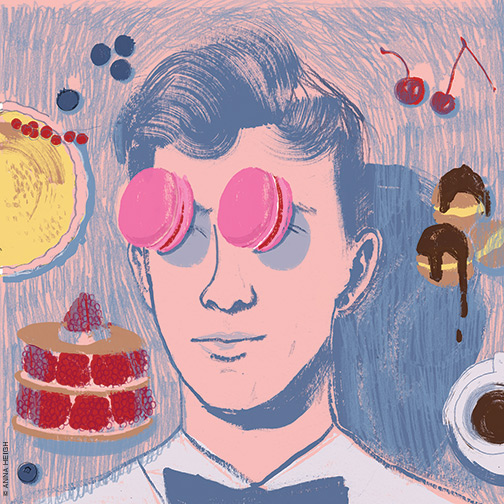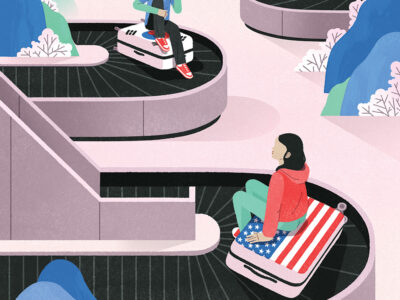
Illustration by Anna Heigh
“When I went home, I wanted decadence.”
By Colin Lodewick
I drove home from the Union League Cafe every night covered in butter and thinking too much about crepes. I thought about crepes folded like blankets around cream and supremed orange segments. I thought about the shatter of creme brûlée, the arrangement of macarons on a dish, profiteroles. I heard a rumor that the head chef went home and could only eat a simple fried egg on bread. After entire days and nights enveloped in the kitchen’s pungent fog, he couldn’t handle anything rich.
When I went home, I wanted decadence.
In my daydreams I was a sous chef caramelizing shallots and chiffonading sage. But in reality I was a busboy who spent shifts running between the dining room and a cramped vestibule where I manned a gigantic, sputtering espresso machine. Unforgiving, it scalded me with unexpected belches of steam as servers crowded around me shouting orders I needed to fulfill immediately.
My summer began with modest hopes. I wanted, first, to go home. I also wanted to feel useful, or to at least learn more about my interests. I worked twice a week at a small arts nonprofit in Brooklyn, doing communications work for a stipend so small it only covered my MetroNorth rides through coastal Connecticut. Back in New Haven I signed on as an arts reporter for a hyper-local newspaper. Indulging in these two underpaid positions, I needed another job to support myself. So I was a busboy, and synthesized a life between the three.
In a city known for its grungy, ancient pizzerias, the Union League Café stands out as a space of elite dining. Half-moon stained glass windows in the dining room filter light through scenes from American history. A plaque by the fireplace explains that the building stands on the site of a homestead George Washington once visited.
My uniform was a crisp white shirt, black pants, black shoes, black socks, and a black bow tie. I was made to memorize a ritualistic list of other requirements. Do not speak to the patrons. Only serve from the right. Clear the table only by beginning with the setting of the eldest female guest. I learned to distinguish dessert forks from salad forks by the indentation of the tines, how to refill glasses of water imperceptibly. I learned to be invisible while constantly present, ready to anticipate any need. I rebelled by wearing socks in a dark shade of red.
Under pressure, I learned to do little things very quickly, all while distracted by the food emerging and disappearing around me. Servers yelled obscenities if I fired an espresso too early, its thin film of bitter foam dying away before it reached the dining room. Servers yelled if I poured steamed milk into a latte from too high up, the liquids mixing instead of forming tricolor stripes of milk, coffee, and foam. While coffee oozed out of the machine, I rapidly donned latex gloves to massacre huge blocks of butter into identical triangles. If I was too slow, servers hooted and yelled.
As I floated between the vestibule and the tables, I watched guests dissect huge plates of oysters nested in strings of seaweed, canard au poivre, mountains of fingerling potatoes blessed with herb aioli. I never got closer than that observation—the staff meal I infrequently received consisted of a spinach salad topped with a cut of plain, dry chicken. On a day off, I drove to a restaurant supply store and bought four small ramekins. If I cleaned up messes during the day and left at night smelling like coffee grounds, I deserved something beautiful at home, alone.
It became a ritual. For weeks, I crept into my house after midnight and pulled the cooled ceramic dishes of custard from the fridge. I experimented. My mother’s half-and-half yielded a more tender mouthfeel than whole milk or heavy cream. Cinnamon didn’t work—it resulted in a textured surface that burned under fire. Using my father’s decades-old blowtorch, I lit up the dark kitchen as I melted paper thin layers of granulated sugar. I waited a minute for it to harden and then cracked it with a sharp tap from a spoon. I compared the taste of the creme brûlée to yesterday’s. And then I went to sleep.
My two other summer jobs lined up with what I thought I wanted to do with my life. I study English, I thought, so I should do something with writing. But New Haven’s arts scene slows to a crawl in the summer, so my newspaper reporting led to only two published stories. At the Brooklyn arts nonprofit I sometimes interviewed artists about their work—a practice that left me feeling distinctly close to meaningfulness, but not close enough. I spent most of my hours copyediting grant applications and designing colorful GIFs to embed in newsletters. During lunch breaks I entertained the other interns with stories from the restaurant.
In the ecosystem of the Union League Café, at least I was an essential employee—not just an accessory intern. Away from my lonely custard fantasy, I made friends with the servers and stood in the dining room expressionless, feeling my power grow along with my mastery of the restaurant’s rhythms. Pending their moods, the servers at the ends of their shifts divided cash tips among the bussers.
One afternoon, I watched the world’s most beautiful macaron sit on the dining room’s red marble counter for over an hour. By then, I thought I knew everything that was happening on the dining floor at all times. I convinced myself that the macaron was ordered by mistake, that I would be doing my job to clear it away. Using the skills of discreetness I’d acquired, I slipped the macaron and its engraved silver tray into to the dishwasher’s station. In a fluid motion I placed it in my mouth and dropped the tray on a pile of other dirty dishes. It was filled with raspberry jam. I walked out happy.
“What are you eating?” the manager demanded upon seeing me emerge.
“A leftover macaron,” I replied.
After a long and cruel reprimand, I fled to the basement. Most staff members found refuge down there in the single bathroom, where a framed photograph of black beluga caviar hung askew on a hook above the toilet and the air was thick with lemon-scented air freshener to mask the smell of cigarettes. I found myself a few feet further down the hall, standing in the walk-in refrigerator. I cooled and calmed down among plastic-wrapped halves of yellow-flesh watermelon, stacked bricks of imported butter, and drawers full of citrus. After a moment, I returned humbled to the dining room to perform again the image of perfect service.
Toward the end of the summer, I began to write a fancy imaginary menu for a fancy imaginary restaurant. I never finished the document and only got so far as to describe Dessert #2. “A feeling of fullness delivered to the center, fulfilled by a volley of pleases and thanks. Folded into a rich batter scented with the love of your mother.”
A dessert that’s not a food but a feeling of contentment. That’s what I was looking for, with my three jobs, my creme brûlée, and that beautiful macaron, but couldn’t find.
Colin Lodewick is a College senior.




